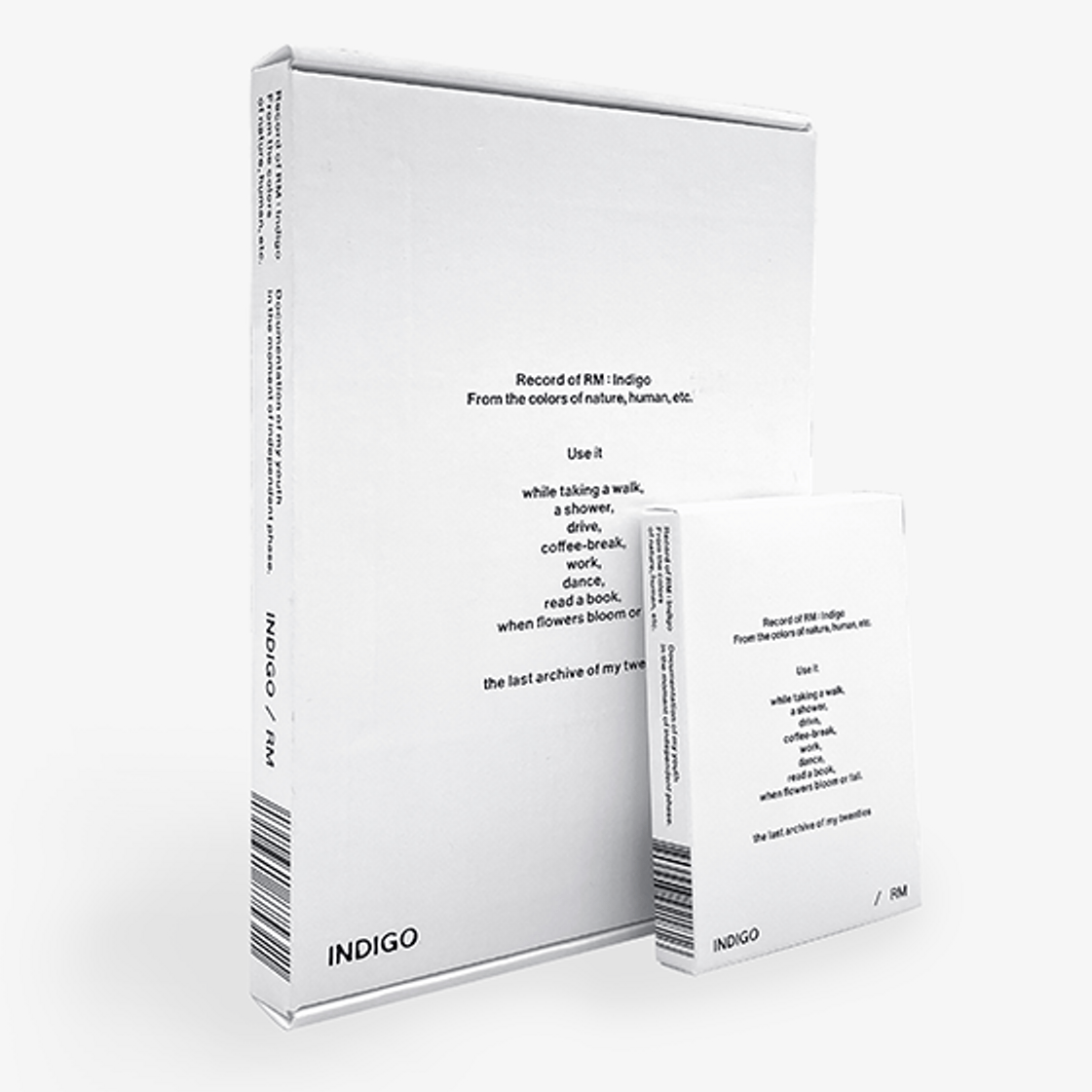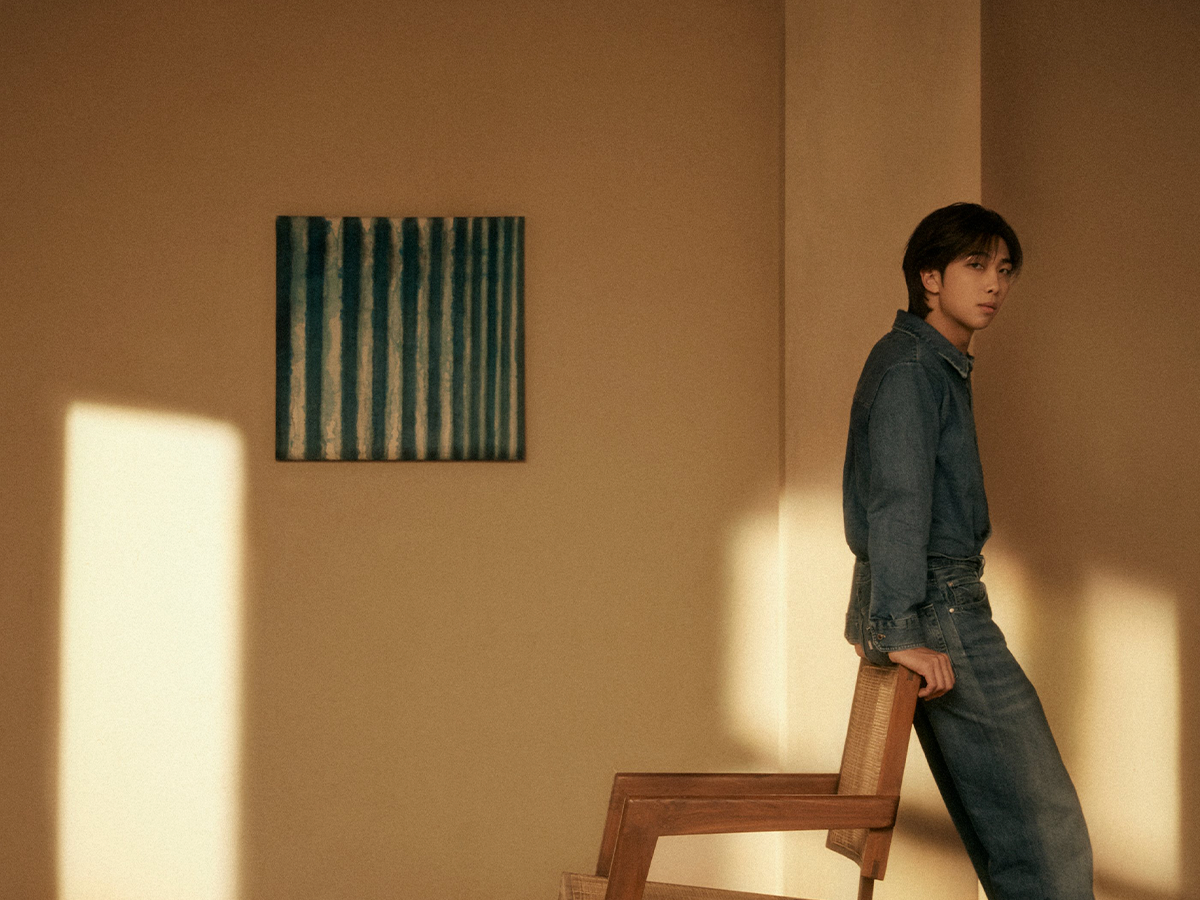
FEATURE
The musicians on RM’s Indigo: Part two
Meet the collaborators on RM’s solo album: Erykah Badu, Anderson .Paak, Tablo, Mahalia and Paul Blanco
2022.11.26
Credit
Article. Kang Ilkwon (RHYTHMER, Music Critic)
Photo Credit. BIGHIT MUSIC
Excitement for RM’s album Indigo is heating up, not only because it’s his first solo release that isn’t a mixtape but also for the list of collaborating musicians that’s already been released. With so many featured musicians—from legends of the US music scene to indie performers in Korea—it’s difficult to speculate just what the album will sound like. In the lead up to the December 2 release of Indigo, music critics Kim Doheon and Kang Ilkwon shed some light for us on the album’s collaborators in this two-part series. Check yesterday’s article for part one if you haven’t already had a chance.
Erykah Badu (“Yun (with Erykah Badu)”)
Where do you even start with someone as great as Erykah Badu? Let’s start with her unique name. Like her music, Erykah Badu’s name is profound and fascinating, incorporating the Egyptian term “kah,” meaning the inner self, as well as her favorite jazz scat sound, “badu.” It’s no exaggeration to say her work is an eclectic mix of genres, stemming from R&B/soul and including jazz, hip hop and alternative. Her works are ahead of the curve at times, and reach into the past at others, showing both the roots and future of the genre.
She was at the forefront of the neo soul movement, a new trend in R&B in the mid-1990s, earning her the title of Queen of Neo Soul. Badu is in every way an inimitable artist. If the sirens from Greek mythology were real, you can be sure they would have sounded like Badu, just not as soulful—her voice truly is that mysterious and alluring. Her vocals are like a flame, flickering and rising again, repeatedly. You can get a sense of this if you listen to “On & On” (1996), one of her best-known songs. On the other hand, in songs such as Then, on songs like “Woo” (2003), she raps with the kind of rhythm that reminds the listener she made her own rap group before her formal debut. Her tone and sense of rhythm are unique and beyond compare, as is her philosophy when it comes to music.
She’s always paid attention to the power of Black music and the messages it can convey rather than getting caught up with radio airtime or the performance of her singles, making her a good example not only for listeners but for her fellow artists as well. Badu’s messages are as varied as they are contemplative, including thoughts on love and human relationships, concern over troubles in the community like drugs, guns and wealth inequality, and loving tributes to hip hop. Every one of her albums, including her reflective debut album, Baduizm (1997), are masterpieces. If you only listen to one of her albums, make it this one, but try and do yourself the favor of listening to as much of her work as possible. Although it’s been a while since she released a studio album, Badu remains an important figure. I can’t even begin to imagine what RM’s collaboration with this massive talent will sound like.
Anderson .Paak (“Stiff Life (with Anderson .Paak)”)
Anderson .Paak surprised listeners with how involved he was with Dr. Dre’s star-studded 2015 album Compton, and it turned out Dre had good reason for his choice as .Paak has since gone on to create an unrivaled catalog of music. His unique voice leaves an indelible mark on every song he works on and he has a knack for blurring the line between hip hop and R&B. .Paak is an eloquent singer-songwriter, a lyricist who’s openly critical of social issues, a producer with one foot in the (musically) traditional and one in the avant-garde and a multi-instrumentalist who occasionally collaborates with others in a supporting role.
The artist values the core aspects of R&B/soul and hip hop, including their history and shared symbolism, but he doesn’t get hung up on mannerisms or fundamentals. Take “Brother’s Keeper,” a song he worked on with coke rap icon Pusha T, as an example. A tense guitar reminiscent of Al Green’s classic “Love and Happiness” builds to .Paak’s heartstring-pulling vocals existing somewhere on the spectrum between rap and song. And that’s to say nothing of his sweet, soulful performance on “Leave the Door Open”!
His discography is golden from start to finish: four solo albums, including the critical darling Malibu (2016); NxWorries, the duo he formed with hip hop producer Knxwledge; and one of the most talked about crossovers of 2021, Silk Sonic, which he formed with Bruno Mars. In an interview with Esquire back in 2021, .Paak was asked how he would feel if he ever had the opportunity to collaborate with BTS. “I’m working on trying to get that plug, man,” he said, half-jokingly. Now he’s working together with the group’s leader, RM. Along with RM’s song with Erykah Badu, this is the collaboration I’m looking forward to most.
Tablo(“All Day (with Tablo)”)
The name Epik High holds a special place in the history of Korean hip hop. The group was partly responsible for the popularization of hip hop in Korea in the 2000s alongside Drunken Tiger, Leessang and Dynamic Duo. At the center of Epik High is rapper Tablo, one of the few first-generation rappers with undeniably tight rapping skills. When most rappers in the early days became overwhelmed by changing trends and the rapid influx of new rappers with incredible flow, Tablo held fast to his territory.
His vocals are somewhat soft but his rapping is nevertheless incredibly solid, capturing the beat by alternating between sharp shots and subdued steps. He has unbelievable range, from emotional, melodic pop rap (“Fly,” “Umbrella”) and thudding boom bap (“Lesson 3 (MC),” “Nocturne (Tablo’s World)”) to lyrical hip hop (“Airbag”). Tablo’s music has found popularity among dedicated fans and with the general public, maintained a balance between pop and other genres and appealed to a wide spectrum of listeners.
Part of what makes him one of the best rappers today is his literary lyrical style, rife with poetic metaphors and multiple meanings. Whether he’s exposing his painful experiences, hurling scathing messages toward toxic media or showing how proud he is of his rapping prowess, he never wastes a single line. He earns the title of lyricist and then some. His first solo album, Fever’s End, released in two parts in 2011, shows off every one of these skills he’s harnessed. And, of course, Tablo’s brilliant rap skills continue to entertain to this day.
Mahalia (“Closer (with Paul Blanco, Mahalia)”)
Unlike most other places in the world, most R&B/soul artists in the United Kingdom haven’t been terribly bothered by the trends of the American music industry. Despite the popularity of trap soul in the US, UK artists have been more focused on music rooted in retro soul of the 1960s and ’70s or ’90s R&B and even created new fusion genres like rhythm and grime. Evidently, there’s something special about the music there, and it’s no clearer than when listening to Mahalia.
She certainly doesn’t seem to be swayed by current trends when you consider the list of artists she calls her inspirations: Corinne Bailey Rae, Erykah Badu, Lauryn Hill, Amy Winehouse, Jill Scott. Her vocals stand out from those of other R&B singers who have recently taken to blurring the lines between the genre and pop music. While the singing techniques commonly heard in the slow jams from the mid-1990s have largely disappeared, Mahalia still bases her vocals on traditional R&B.
But that doesn’t mean her music is old-fashioned. Her songs are largely reminiscent of melodic rap from the late 1990s and into the 2000s. Give her second album, LOVE AND COMPROMISE (2019), a listen to get a sense of what she’s all about. The soundscape and arrangements hold your attention and the melodies bring the songs to life. It’s the kind of album that you can slowly sink into rather than let it take its best shot at your ears right out the gate. As one of the most notable R&B/soul artists working today, it’s no wonder she won Best Female Act and Best R&B/Soul Act at the MOBO Awards in Britain in 2020.
Paul Blanco (“Closer (with Paul Blanco, Mahalia)”)
Korean hip hop is currently known for its singing rap style, emphasizing melodic flow, and Paul Blanco is among the best artists performing in the scene and in the style today. He’s great at production, rapping and singing, and he’s just as at home doing trap as he is doing alternative R&B. Perhaps most notably, his lyrics describe his childhood as an immigrant in Canada, separating his work from that of other Korean rappers. One good example is his verse in “Siren Remix” by Homies, where he raps about the racism he’s faced.
He’s quickly been gaining recognition since 2018, featuring on songs by famous rappers like CHANGMO, The Quiett and UNEDUCATED KID. While it’s true that their star power helped push a then-unknown rapper into the spotlight, it was ultimately Blanco’s impressive skillset and push for perfection that brought him to where he is today. In other words, there’s no hip hop nepotism here. He also produced “Hey Big Head” and “Créme” for superstar Jack Harlow. Clearly, Blanco’s sphere of influence is growing.

Weverse Shop

RM (BTS) - Indigo
Copyright © Weverse Magazine. All rights reserved.
Unauthorized reproduction and distribution prohibited.
Unauthorized reproduction and distribution prohibited.
Read More
- The musicians on RM’s Indigo: Part one2022.11.25
